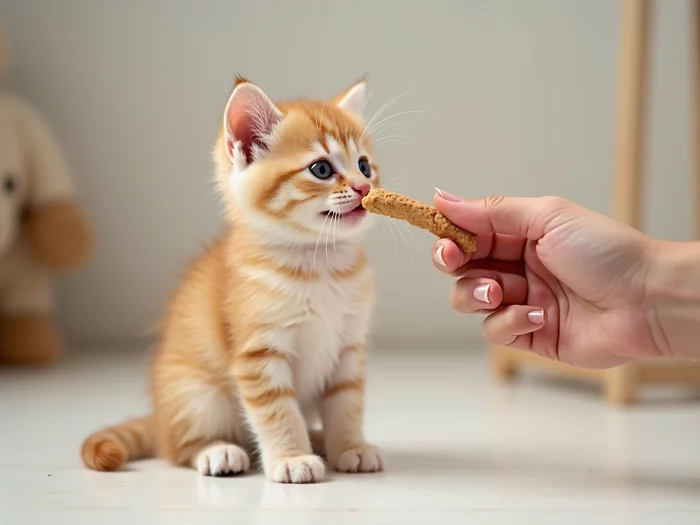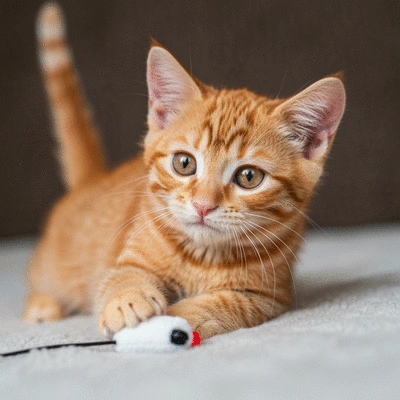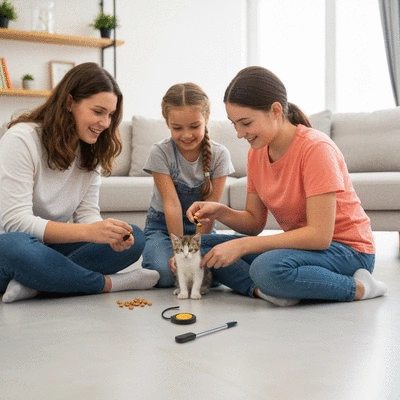Weeks 1-4
Focus on litter box training and name recognition.
Ready to be the best kitten parent ever? Get expert tips, product reviews, and essential guides delivered straight to your inbox!
Posted on: 2025-11-14
By: Edyta Drabek
Have you ever wondered how to set a solid foundation for your new furry friend? Training your kitten during their first year is crucial for their happiness and well-being. Here’s what you’ll discover about the importance of early training and its long-lasting benefits.
This visual outlines key commands and milestones in a kitten's first year of development, providing a clear guide for new pet parents.
Focus on litter box training and name recognition.
Start introducing basic commands like ‘Sit’ and ‘Come’.
Reinforce commands and begin socialization exercises.
Teach additional commands such as ‘Stay’ and ‘Down’.
Focus on refining skills and addressing behavioral issues.
As a first-time kitten parent, you might be wondering why training your little furball is so important. Well, starting early with kitten training can lead to amazing benefits! It not only aids in their behavioral development but also helps strengthen the bond between you and your new friend. After all, who doesn't want a well-behaved, happy kitty?
Training your kitten can significantly reduce unwanted behaviors and enhance their confidence. Plus, it’s a fantastic way to spend quality time together, making those first months memorable!
Training your kitten early establishes a foundation for good behavior. By introducing commands and routines from the get-go, you're setting them up for success in their new home. Here are key benefits of early training:
Consistency is key during this phase. Regular training sessions can make all the difference in your kitten's adjustment to their new environment!
At Kittie Care Central, we emphasize a few core principles that make training effective and enjoyable. Firstly, positive reinforcement is a game changer! Rewarding your kitten with treats or affection when they respond correctly encourages them to repeat the behavior. You can find more information on positive reinforcement techniques on reputable veterinary sites like VCA Hospitals.
Another method worth considering is clicker training. This technique uses a click sound to mark desired behaviors, making it clear to your kitten what they did right. Finally, remember the importance of consistency. Regular training helps your kitten learn faster and understand what you expect from them.
Socialization plays a crucial role in your kitten’s first year. By exposing them to various environments, people, and even other pets, you help them become well-adjusted adults. This experience not only reduces anxiety in new situations but also promotes friendly behavior.
The more positive interactions your kitten has during this period, the better prepared they will be for the world around them!
One of the first commands your kitten will learn is how to use the litter box. This essential skill is crucial for their comfort in your home. To effectively train your kitten, start by:
With a little patience and encouragement, your kitten will quickly learn to use the litter box, ensuring a tidy home!
The first step in your training journey is teaching your kitten to recognize their name. This is vital for building communication. You'll want to use the lure method combined with positive reinforcement:
Before you know it, your kitten will come running whenever they hear their name, making training even easier!
Did you know? Consistently using the same training cues and commands can significantly enhance your kitten's learning process. For instance, if you always use "come" instead of varying it with "here" or "over," your kitten will learn faster and feel more secure in understanding what you expect from them!
Training your kitten is a team effort, especially in multi-person households. It's crucial to maintain consistent training practices among everyone involved in your kitten's care. Here are some tips to ensure everyone is on the same page:
By working together, you’ll not only improve your kitten's learning experience but also strengthen the bond among all caregivers. Remember, consistency is key!
Having a training timeline can be incredibly helpful for new kitten parents! It sets realistic expectations and helps you stay organized. Below is a simple visual timeline illustrating age-appropriate commands and milestones in training development:
This timeline is just a guide. Your kitten may reach these milestones at different paces, and that's perfectly okay! Just remember to celebrate every little win!
Incorporating the right training tools can significantly enhance your kitten's learning experience. Here are some essential tools that I recommend to help facilitate training:
Remember, the right tools can make training more fun and productive for both you and your kitten. Don’t hesitate to try different items to see what works best for your little furball!
Here is a quick recap of the important points discussed in the article:
Early kitten training is crucial because it establishes a foundation for good behavioral development, minimizes unwanted actions like scratching furniture, and strengthens the bond between the kitten and its owner. It also helps build the kitten's confidence and makes them more adaptable to new situations.
The core principles include positive reinforcement (rewarding desired behaviors with treats or affection), clicker training (using a click sound to mark correct actions), and consistency across all caregivers. These methods make learning enjoyable and help kittens understand expectations faster.
Socialization is key to developing a well-rounded kitten. By exposing them to various environments, people, and other pets, you help reduce anxiety in new situations and promote friendly behavior, preparing them to be confident and adaptable adults.
The very first skills to focus on are litter box training and name recognition. Once these foundational skills are established, you can gradually introduce basic commands like 'Sit' and 'Come'.
Recommended training tools include a clicker for positive reinforcement, small and tasty treats as rewards, interactive toys for play-based learning, and training pads for guiding litter box habits. Experiment to find what works best for your kitten.



 As you embark on the journey of kitten parenting, understanding your little furball's nutritional ne
As you embark on the journey of kitten parenting, understanding your little furball's nutritional ne
 As you embark on the rewarding journey of kitten parenthood, understanding the significance of choos
As you embark on the rewarding journey of kitten parenthood, understanding the significance of choos
 Early training is not just a phase; it's a cornerstone of a kitten's lifelong behavior and well-bein
Early training is not just a phase; it's a cornerstone of a kitten's lifelong behavior and well-bein